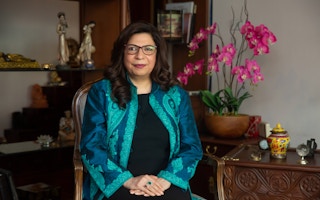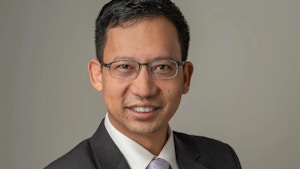The Rockefeller Foundation, thanks to the vast wealth amassed by the late American oil magnate John D. Rockefeller, has been pouring philanthropic funds into Asia for more than a century, led by a grandiose mission to “promote the wellbeing of humanity”.
To continue reading, subscribe to Eco‑Business.
There's something for everyone. We offer a range of subscription plans.
- Access our stories and receive our Insights Weekly newsletter with the free EB Member plan.
- Unlock unlimited access to our content and archive with EB Circle.
- Publish your content with EB Premium.
The New York-headquartered foundation’s Bangkok-based Asia vice president, Deepali Khanna, believes her organisation could have greater impact in the region if it worked with Asia’s sprawling family business empires to solve social and environmental problems which have got a lot worse thanks to the Covid-19 pandemic.
But Khanna is conscious that big Western organisations like Rockefeller could be seen to be preaching to Asian partners about how philanthropic capital should be spent in Asia — not a good look in the post-colonial era. “It is the Asian decade,” she told Eco-Business. “We don’t want New York to determine what needs to be done in Asia.”
It is partly for this reason that The Rockefeller Foundation is backing an initiative to promote local changemakers called the Asian Impact Leaders Network (AILN). Launched in June in partnership with Asian Venture Philanthropy Network (AVPN), a platform for social investors, AILN is an initiative that Khanna wants to give a voice to Asian philanthropic talent working on the Sustainable Development Goals (SDGs).
Asia’s progress on the SDGs has gone backwards since the Covid outbreak, and AVPN’s chief executive Naina Batra recently said that Asian funders need to “step up” and “be bolder” in their investments to help fill a yawning SDG funding gap that has reached US$4.2 trillion a year.
Khanna agrees. Just under two-thirds of the world’s population and 42 per cent of the world’s wealth is in Asia, “so it’s time for Asian leaders to take a more active role in social investment,” she said.
Khanna said there is a need to “nurture” domestic philanthropy and share “the good, the bad, and the ugly” that The Rockefeller has learned over the past 109 years, so that Asian funders can avoid making the same mistakes. “Just because we have the resources, doesn’t mean we have all the wisdom,” said Khanna, who has more than 30 years experience in the development sector, the last seven and a half with The Rockefeller Foundation.
“
We are a small drop in the ocean. The funding gap for achieving the SDGs is US$4.2 trillion a year. Our annual grant-making is US$200 million.
The idea behind AILN is to elevate the profile of Asian funders, government officials and social entrepreneurs, and mobilise funds to tackle issues that Asia is really struggling with, such as decarbonisation and energy inequality.
The network, which has 16 individuals so far, includes the likes of Ng Boon Heong, chief executive of Singapore’s state-backed Temasek Foundation, Dr Arunabha Ghosh, chief executive of India’s Council on Energy, Environment and Water, and Kyungsun Chung, managing partner of The Sylvan Group, a private equity investment backed by the Hyundai family.
“We started with 16. But we want to get to 1600,” said Khanna. She admited that although AILN has started out with people from the “elite”, it aims to secure more involvement from youth and grassroots actors. “We need to move the conversation closer to the field, to the people who really matter,” she said.
Khanna wants the network to go beyond Asia, and unite leaders from elsewhere in the Global South ahead of the G20 summit in November in Bali, Indonesia.
“I feel strongly about getting the voice of the Global South heard. But we can’t just keep talking about it,” she said.
After Bali, the G20 will be held in India in 2023, then in Brazil in 2024. This presents an opportunity for poorer countries – those feeling the harshest effects of a climate breakdown they contributed the least to – to push their agenda and talk about developmental issues on their terms.
“We have a lot of impactful leaders in the region. We need to identify them and get them together. There’s a lot of good work going on, but it’s happening in silos,” said Khanna.
In this interview, Khanna talks about how The Rockefeller Foundation allocates capital in Asia, the foundation’s Big Oil legacy, impact-washing, and why the young generation of Asian social entrepreneurs needs to “be bolder”.
Asia Pacific has fallen behind on all of the SDGs. How does the Rockefeller Foundation allocate capital for this region?
Our board approves our strategy for a five-year period, but it changes according to how the world is changing. We examined the inequalities that were heightened during Covid, and focused on areas such as energy poverty and public health.
These are hard choices to make. We are a small drop in the ocean in the grand scheme of things. The funding gap for achieving the SDGs is US$4.2 trillion a year. Our annual grant-making is US$200 million globally. So to really have impact, we are increasingly collaborating with others to drive scale.
One example is our work in the run-up to COP26. We wanted to reduce 1 billion tonnes of greenhouse gas emissions and empower 1 billion people with distributed renewable energy, so we partnered with IKEA Foundation and Bezos Earth Fund to set up a US$1 billion platform to fight climate change and energy poverty.
At the recent AVPN Global Conference, a key theme was the need for Asian philanthropists to “step up” and take bigger risks to deploy capital where it is most needed. How does Rockefeller Foundation work with Asian foundations to drive impact?
As a global foundation, we come in when we’re asked to. There is a need to nurture domestic philanthropy, but we don’t tell domestic operators how things should be done. Just because we have the resources doesn’t mean we have all the wisdom. Not everything we’ve done over the last 109 years has been done right. We want to share the good, the bad and the ugly with Asian foundations. We want them to be able to leapfrog, not go through the same learning curve. This is the Asian decade. We don’t want New York to determine what needs to be done in Asia.
I feel strongly about getting the Global South voice heard. But we can’t just keep talking about it. We have a lot of impactful leaders in the region. We need to identify them and get them together on a platform. There’s a lot of good work going on, but it’s happening in silos. The G20 is being held in Indonesia, then India, Brazil and South Africa. This is a real opportunity for the Global South to come together and talk about the issues that need to be addressed, such as climate adaptation.
What are some of the mistakes that The Rockefeller Foundation has made in Asia that others could learn from?
About 10 years ago, we worked on an energy access project in India. We wanted to get the private sector involved to drive scale in distributed renewables to help the 250 million people in India without reliable electricity.
We asked the private sector about the issues they wanted addressed. The first was help with policy bottlenecks. Second, they didn’t have confidence in the willingness of consumers to pay for renewable energy. Thirdly, they wanted some kind of debt financing.
“
We want our resources to be used as high-risk capital. There is no ready-made easy way to fixing tough problems. If there was, we’d be closer to achieving the SDGs.
We realised that if we didn’t invest some grant capital and run some mini-grids ourselves, the project wouldn’t go any further. So we grant-funded 30 mini-grids, and from that experience communicated what worked and what didn’t to the private sector. This gave companies confidence that it could be done. Now, there are 500 mini-grids being run by the private sector in India.
As a foundation, we want our resources to be used as high-risk capital. There is no ready-made easy way to fixing tough problems. If there was, we’d be closer to achieving the SDGs. We need to be taking more risks, experimenting and learning from mistakes if we are to see the progress we need.
You mentioned the need to take risks. But The Rockefeller Foundation insists on measurable impact when funding a project. Aren’t you disincentivising risk by demanding a return?
I don’t see it that way. The term “impact investing” was coined by the Rockefeller Foundation [in 2007], and over the years we’ve used a variety of instruments to drive impact. We need to constantly measure and review performance to work out why things may not be working, and how they can work over the long term.
The Rockefeller Foundation’s roots are in Big Oil, as it was set up by the founder of Standard Oil, which later became ExxonMobil. Does this legacy give Rockefeller Foundation a credibility problem?
We have fully divested from fossil fuels [The Rockefeller Foundation announced it would divest its $5 billion endowment from existing fossil fuel interests in 2020], and have built a reputation from more than a century of work in Asia. When I go to China and say I’m working with The Rockefeller Foundation, they say: ‘you brought medicine into China’. Many of India’s top health institutes, for instance the National Institute of Virology, were founded with our support. We have built up credibility from testing, piloting, trying and failing, and leveraging that knowledge.
A foundation I met at AVPN refused to share which families are backing the fund. What do you make of growing concerns around impact washing?
We all we need to be held accountable. I strongly believe in downward accountability. Accountability should not just be to the board – it should be to our partners and the communities we’re serving. If we are collaborating with other entities, we need to think about metrics we use to hold each other accountable.
Do you have any advice for emerging young social entrepreneurs in Asia?
Don’t be shy to ask tough questions to find and test new solutions and broaden your network. One of the problems [in philanthropic circles in Asia] is that we keep talking to the same actors and having the same conversations. To find new solutions, and move Asia Pacific forward, we need the new generation to step up and be bolder.
This interview has been edited for brevity and clarity














